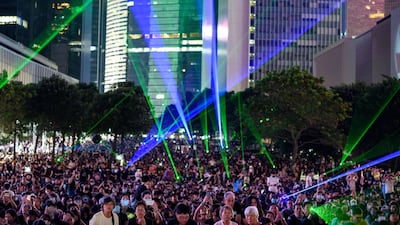Tens of thousands of Hong Kongers gathered on Saturday night to mark the fifth anniversary of the Umbrella Movement, the failed pro-democracy campaign that laid the groundwork for the massive protests currently engulfing the finance hub.
Huge crowds chanting slogans and singing protest songs crammed into a park outside the city's parliament, the same site that was the epicentre of the 2014 protests.
Hundreds later spilt out on to a main road outside the city's government offices.
The Umbrella Movement exploded when huge crowds came out after police fired tear gas at a student-led rally which had taken over the same highway — and was named after the ubiquitous tool people used to defend themselves from police.
Both 2014's protests and the current demonstrations were fuelled by fears that Beijing is eroding freedoms in the semi-autonomous Chinese city and frustrations over the lack of direct elections.
But the character of the protests has noticeably hardened in the intervening years.
Compared to the current strife — where street battles have erupted for 16 consecutive weeks — 2014's protests were softer, with students completing classwork in the camps, recycling their waste, and the police largely avoiding direct conflict during the 79-day occupation of three key intersections.
This summer's pro-democracy protests have had a distinctly more existential feel, with hardcore activists throwing Molotovs and bricks, police using tear gas, rubber bullets and water cannon and Beijing issuing increasingly shrill warnings.
Earlier on Saturday, Joshua Wong, a prominent former student leader who served a short jail sentence for his role in organising the 2014 protests, announced that he would stand in coming district council elections.
He recently returned from the United States where he testified before a Congressional committee about eroding freedoms in Hong Kong, infuriating Beijing.
This summer's protests were ignited by a now-scrapped plan to allow extraditions to the authoritarian mainland.
But they have snowballed into a wider movement calling for democratic rights and police accountability after Beijing and the city's leader Carrie Lam took a hard line.
Activists are planning to ramp up their protests in the coming days.
Beijing is preparing a huge military parade on Tuesday to mark 70 years since the founding of the People's Republic of China, revelling in its transformation into a global superpower.
But democracy protesters are determined to take the shine off the festivities.
Rallies are planned for Sunday to mark a Global Anti-Totalitarianism Day, with solidarity events planned around the world in Taipei, Paris, Berlin, New York, London and Vancouver.
Students are planning a class boycott on Monday while online messaging boards used to organise the largely leaderless protests have filled with calls to disrupt celebrations of the People's Republic's 70th anniversary.
Police have banned a proposed march for Tuesday. Previous bans have been widely ignored and soon descended into violence.
The government scrapped plans to hold a traditional firework display to mark the anniversary and have moved a flag-raising ceremony indoors, citing security concerns.
Among the demands being made by protesters is an independent inquiry into the police, an amnesty for the 1,500 people arrested and universal suffrage.
But Ms Lam rejected the calls as she held the first of a planned series of meetings with residents to address concerns that have fuelled months of protests.
“I believe this is a very good first step towards resolving this crisis,” Chief Executive Carrie Lam told the 150 people gathered at the city’s Queen Elizabeth Stadium on Thursday.
The participants were randomly selected from about 20,000 people who sought to attend the event. Thirty were allowed to speak after being picked in a draw of lots.
Ms Lam said the “community dialogues” she had initiated were not mere “political shows” and that she would work with colleagues to address the concerns raised. But despite her attempt to defuse anger, the event was largely shaped by the attendees’ fiery questioning and accusations.

